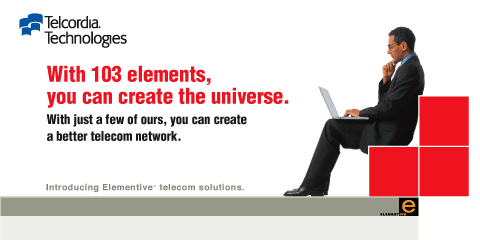
|
The Word from TeleManagement World:
OSS must get down to business, but business is good
By Edward J. Finegold, Editor-in-Chief
Though this October's TeleManagement World (TMW) event in Long Beach was more subdued than the May event in Nice, France, the consistent message was that OSS is getting down to business. Attendees were largely focused on the Forum's technical sessions and learning more about how to apply eTOM and NGOSS principles. Even early “birds of a feather” sessions aimed at identifying areas for new work groups drew interest, particularly one focused on defining benchmarks for measuring OSS . Catalyst projects were similarly centered on business processes, and the TeleManagement Forum (TMF) stressed the importance of relevance, practicality and deliverability in the proposed solutions.
From a vendor perspective, there were few key announcements and much of the chatter on the show floor centered around Telcordia's ongoing sale and how Cramer and MetaSolv will have to work together for BT. Big news also hit shortly after the TMW event as Watchmark-Comnitel announced its plan to acquire ADC's Metrica business. The mixed message out of this event is that OSS still has plenty of growing up to do, but in the meantime business is good.
Keynotes Focus on Messages and Transformation
TMF President Jim Warner’s opening address painted an optimistic future for the Forum itself. “[TMF] has never been healthier or better positioned to solve the industry’s problems,” said Warner. TMF is financially healthy, he said, due to a strong increase in membership from the billing and BSS sectors, greater global participation in the Forum, and the organization’s adoption of its own “lean” operating principles. “We’ve chosen to eat our own cooking,” said Warner. The Forum has also extended its reach into Asia, with events in Bangalore, Tokyo and Beijing scheduled and plans to expand in ’05. He said TMF should exceed 400 members this year, which would carry total membership above its peak 2000 numbers.
Looking at the Forum's technical work, Warner focused on the importance of practicality in catalyst projects and the need for TMF to work closely with peer organizations like the IETF, which has embraced the eTOM. Highlighting a common theme, Warner also voiced the need for TMF to broaden its appeal “beyond the technical fraternity” and provide carrier executives with strong examples of how companies in other industries have transformed and succeeded.

TMF founder Keith Willetts ran with the transformation theme, focusing on the fact that carriers cannot continue to reduce headcount and expect to improve. “Putting in more networks without changing the business doesn't work,” Willetts said. He explained that carriers are, for the most part, not developing economies of scale in the way they approach new services and operations. As a result, they fail to reduce their operating costs, prices drop, and they do not create a Moore 's law effect by using lean, common infrastructure to manage an expanding number of services and features.
All of the blame, however, Willetts did not rest at service providers' feet. Painting a stark but realistic picture of the OSS market, he said “the next wave of multi-service networks could make the current wave of OSS products obsolete” because so many have been built specifically for network technology silos. He also pointed the finger at TMF, however, and admitted that the Forum must do a better job of explaining how a carrier can become a “lean operator” and make that story more compelling to senior executives.
To make this happen, Willetts asked for better marketing cooperation among TMF members in sending clear, executive-focused messages that highlight the value of things like eTOM and NGOSS. He also argued for a framework by which OSS ' value can be measured and demonstrated (see sidebar “Birds of a Feather” Flock to Metrics ). Most importantly, he urged the vendor community to build products that will reduce the integration tax but embrace the multi-service world, going as far as to encourage the development of open source OSS products. Perhaps most important was Willetts' argument for a shift in mindset from a systems focus to a business focus, saying “business change drives process change, which drive systems change – not the other way around.” For business executives to understand and appreciate the TMF's contributions, this business and process-first focus must be the mindset.
Next » |
1 |
2 |
3 |
4 | Subscribe
© 2004, All information contained herein is the sole property of Pipeline Publishing, LLC. Pipeline Publishing LLC reserves all rights and privileges regarding the use of this information. Any unauthorized use, such as copying, modifying, or reprinting, will be prosecuted under the fullest extent under the governing law.
|
 |



